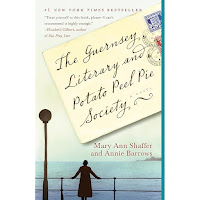 |
| (Amazon UK link) |
I quickly discovered that the book is epistolary in nature -- in other words, a series of letters. I’m not generally very keen on that style of writing, although I have read a few book written this way, but having started, I decided I’d finish even if I had to skim somewhat. However, once I got into the story, I found it very readable, with delightful characters (if a tad caricatured at times).
The novel, which is set in 1946, opens with a letter from Juliet. She is the main protagonist of the story, and is a published writer. We quickly learn that she wrote a newspaper column under a pseudonym, and that several of her columns were re-published in book format. She’s been on a promotion tour and is pleased with how the sales are doing. But she’s struggling to come up with a second book…
Her publisher is a friend called Sidney whom she’s known most of her life, and she’s very close to his sister Sophie who is married with a young child, and who lives in Scotland. We learn a little about them both from the first couple of letters. Then Juliet receives a letter, out of the blue, from a man called Dawsey who lives in Guernsey. He has bought, second-hand, a collection of writings by Charles Lamb, and has found her name and address written on the inside cover. He’s asking if she knows of anywhere in London where he can order some more of Charles Lamb’s writing, or a biography about him.
Dawsey mentions that the book kept him entertained during the Nazi occupation of the island, and also mentions the unusually named society which is the title of the novel. Juliet’s curiosity is piqued, so she makes some enquiries at her favourite bookshop, and responds to Dawsey, asking about the origins of the society.
A correspondence ensues, with some of Dawsey’s friends mentioned - and they, too, start writing. I found it a tad confusing trying to remember who was whom, and never entirely sorted them out in my mind. But it doesn’t matter all that much; the main ones are obvious. And through the letters, we learn, initially with hints and later with some fairly gritty detail, what it was like for the Guernsey islanders under the occupation.
Juliet becomes more and more intrigued and decides to visit Guernsey for herself, where she quickly makes friends, particularly with a small girl whose father died in the war, and whose mother is in prison abroad but nobody has heard from her in a long time. She gathers more and more material, certain she has a topic for her new book…
There’s a lot more, of course. There’s humour, there’s poignancy, and there are some quite unpleasant incidents too. Fiction like this is often a good way of making history come alive, and I learned a great deal about the Nazi occupation of Guernsey. It’s something I had only really known about previously through the somewhat sanitised references in the relevant books or fill-ins of the ‘Chalet School’ series.
There are romantic threads - sort of - in that a wealthy young man courts Juliet before she leaves for Guernsey and wants to marry her. She’s not sure at all, as she’s a strong-minded young woman and he seems to want a trophy wife. But the wining, dining and flowers are quite persuasive. Her eventual romantic liaison comes rather out of the blue and I wasn’t expecting it.
The disadvantage of epistolary fiction is that although we learn about the thought processes of the letter writers, we don’t actually see much action. And there are so many letter writers that we don’t really get to know any of them. I prefer a novel with characters I can relate to, and while most of them are likeable, I didn’t feel as if I could empathise with anyone.
Still, with that proviso, I thought it a well written book, with a good pace that didn’t allow me to get bored. From a social history point of view it covers a little-known aspect of World War II, with a mostly benign occupation, albeit with a lot of strict regulations.
Recommended to anyone interested in this era, or wanting something a bit different to read.
Review copyright 2023 Sue's Book Reviews
No comments:
Post a Comment